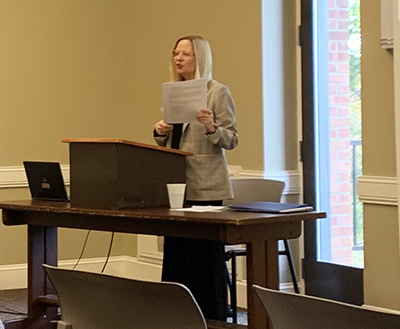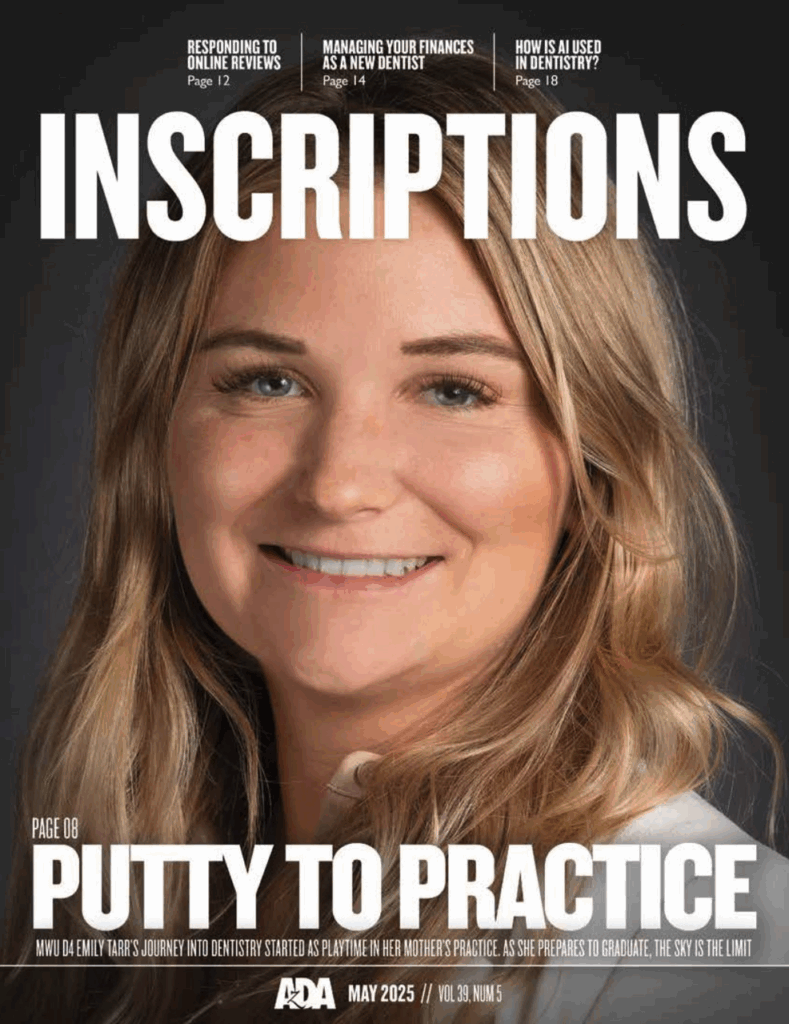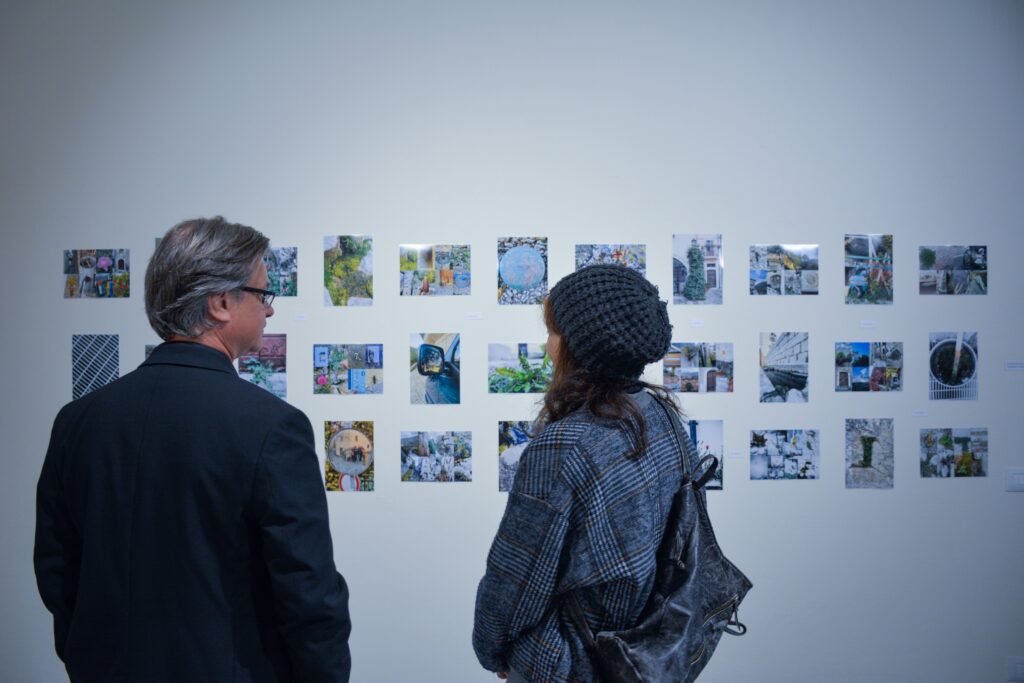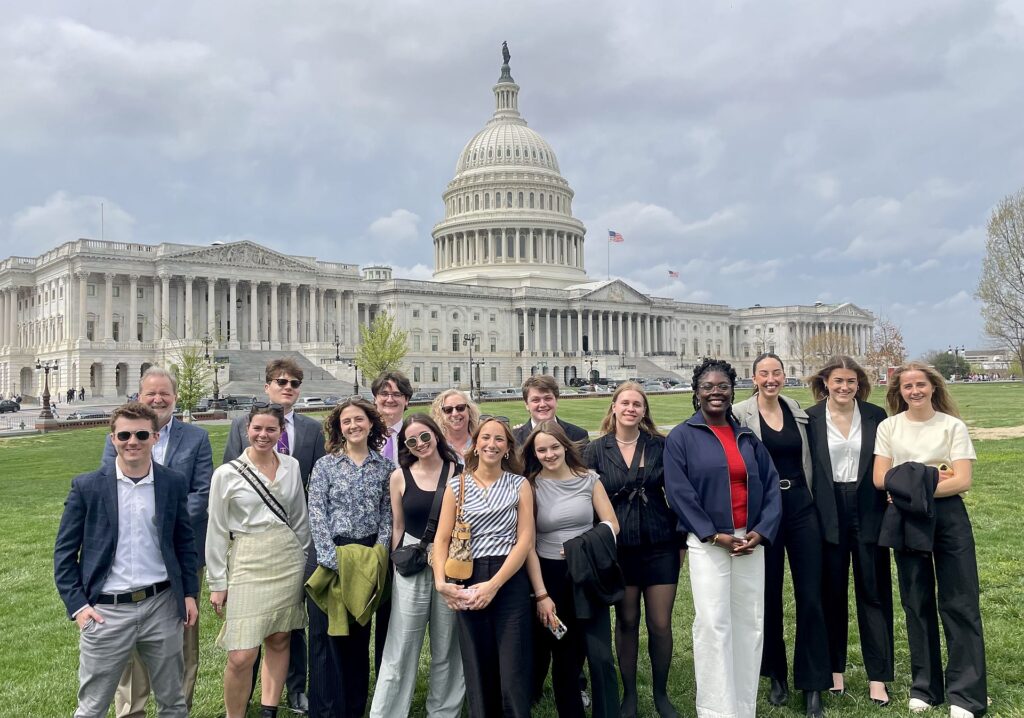
Poet and critic Ange Mlinko presents in the Farrell Room Thursday afternoon. (photos by Kaylee Sayers ’23)
The Humanities Center and the Honors Program at Saint Michael’s College sponsored a lecture by Ange Mlinko, poet and critic, on Thursday afternoon, October 6 in the Farrell of St. Edmund’s Hall. Her talk, titled “Poet, That’s Just Like You! Language and the Figure of Echo,” held the close attention of students and faculty who filled the lecture room.
Christina Root, English professor and co-director of the Humanities Center with philosophy professor Crystal L’Hôte, introduced Mlinko. She lauded not only Mlinko’s own poetry, but also her other published works such as her critical essays, likening her essays to art. The afternoon sun shone bright through the Farrell Room windows as Mlinko began her lecture.
“I’m very happy to be here today to give this lecture,” Mlinko said. “Poetry is a big field, and my task right now is to distill it into a single figure: Echo.” The figure of Echo is both a sound as well as a character from Greek mythology. Mlinko’s lecture used the figure of “Echo” as a mode through which to view and experience poetry. “Sound precedes semantics,” Mlinko said, referring to the conclusion that many critics come down upon regarding poetry, despite different theoretical backgrounds. She then introduced the audience to three poets from the 19th and 20th centuries who all came from different cultures, languages, and even religious backgrounds, but all who implemented the figure of “Echo” into their poetry.
Gerard Manley Hopkins was the first and most important poet Mlinko spoke about. He studied and wrote in a Welsh poetry style known as Cynghanedd, and Mlink referenced two of his poems titled “The Golden Echo” and “The Leaden Echo.” “Here we observe, amazed, the elasticity of syntax,” Mlinko said. The call and response style of the Cynghanedd poems perform the idea of the echo in both their titles and their performance. The ways in which Hopkins implemented the figure of the “Echo” was in “close repetition of consonants and vowels… wholesale repetition of words and phrases… and rhyme; rhyme is echo with a difference,” Mlinko said.
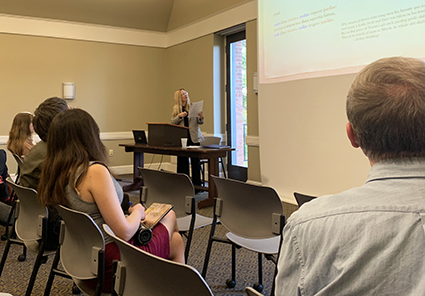
Ange Mlinko makes a point about poems projected during her lecture Thursday.
The tradition of “Echo” not only as the sound but also as the figure from Greek mythology creates a theme or a window through which the reader can glean meaning from the poetry. The Greek mythological character Echo was cursed by the goddess Hera to only be able to repeat the ends of people’s sentences, effectively robbing her of her own voice. Through this lens, poets are able to create a depth of meaning behind their poems based in history, culture, and the mystical. “Poems are songs in which we make syllables dance,” Mlinko said.
Elizabeth Bishop was the second poet Mlinko introduced. Bishop was a fan of Hopkins’ poetry and saw “echo” in poetry. The poem that Mlinko read aloud to the audience by Bishop was titled “The Filling Station,” which Mlinko explained had a true mode of repetition.
Alexander Pushkin was the final poet who utilized the figure of “Echo” in his poetry, and Mlinko read aloud his humorous poem “Echo” as the finale.
“We might look at literature as… something to wander around at our leisure,” she said, but it is something of a lockbox of our traditions and a “communal way to talk to the dead.” Echo, Mlinko said, creates a way for poets to talk to one another across countries, cultures, and millennia.
The Q&A portion of the lecture was lively as Mlinko fielded questions from the audience:
Is the notion of the echo present in your own work? If so, how do you apply it?
Mlinko said, yes, echo appears in her own poetry. “Why not just write an essay?” She posited, “The poem has to incorporate echo to metamorphize into a poem”
When you write poetry, do you know the meaning when you start?
“Now I definitely know what I want to speak about,” Mlinko answered, “But I used to think I could just start from the ‘music.’”
What did you mean by “echo” rising out of the material rather than poets directing the meaning?
“Poets are pattern makers and pattern seekers,” Mlinko said. “Hopkins would have imbibed a lot of poetry since his early years… I don’t think he necessarily intended all the ‘echoes.’ His poems are saturated with these patterns. That’s where the fun of interpretation is.”

For all press inquiries contact Elizabeth Murray, Associate Director of Communications at Saint Michael's College.
